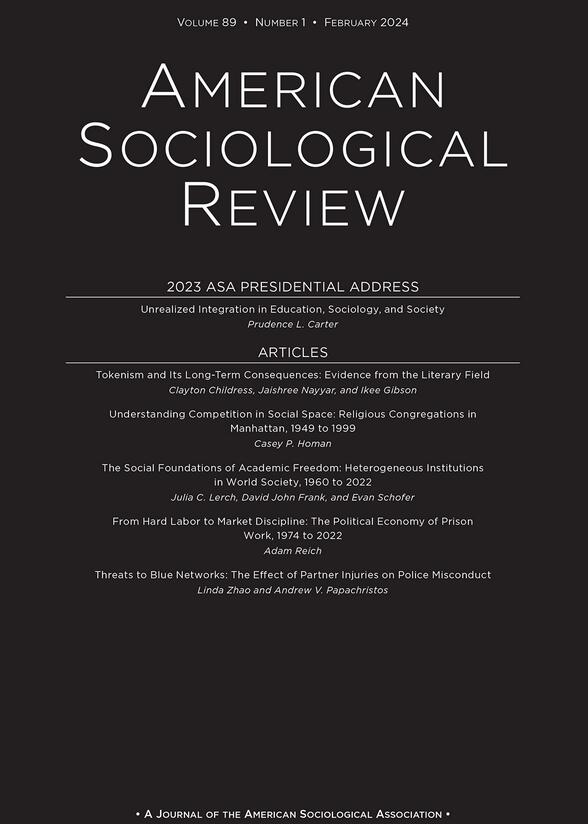法国重生:解释法国纵向数据中公民声明的不一致性
IF 6.2
1区 社会学
Q1 SOCIOLOGY
引用次数: 0
摘要
公民身份是当代社会的基本界限,它包含权利、归属感和社会地位。利用纵向人口普查数据,本文追踪了30年来法国自我报告的公民身份的个人变化。受访者在以下三种情况中选择一种:“出生在法国”、“成为法国人”或“外国人”。第一类人在一生中应该是稳定的:一个人出生,但不能成为“天生的法国人”。然而,我们的研究结果表明,在一次特定的人口普查中,大约19%的外国裔受访者在下一次人口普查中转向“出生在法国”的声明,我们称之为重新分类的过程。移民同化变量,如出生和停留时间,以及异族通婚、入籍和居住流动等事件,都会触发重新分类。然而,在社会经济地位较低的个人、非洲和东南亚裔以及前法国殖民地的受访者中,重新分类的比例也较高。这些发现表明,重新分类是移民同化的副产品,它引发了民族认同和地位提升的感觉,弱势群体和受歧视群体通过改变他们的公民身份声明来补偿低社会地位。从经验上讲,重新分类为公民身份、公民分层和跨界的意义提供了独到的理论见解。本文章由计算机程序翻译,如有差异,请以英文原文为准。
Born Again French: Explaining Inconsistency in Citizenship Declarations in French Longitudinal Data
Citizenship is a fundamental boundary in contemporary societies that entails rights, a sense of belonging, and social status. Drawing on longitudinal census data, this article tracks individual changes in self-reported citizenship over 30 years in France. Respondents choose one of three categories: “French by birth,” “became French,” or “foreigner.” The first category should be stable over the life course: one is born, but cannot become, “French by birth.” Yet, our findings indicate that about 19 percent of foreign-origin respondents in a given census switch to “French by birth” declarations at the next census, in a process we call reclassification. Immigrant assimilation variables, such as nativity and length of stay, and events such as intermarriage, naturalization, and residential mobility, trigger reclassification. Yet reclassification is also higher among individuals with lower socioeconomic status and respondents of African and Southeast Asian origin, as well as those with origins in former French colonies. These findings suggest reclassification is a byproduct of immigrant assimilation, which triggers feelings of national identity, as well as status upgrading, whereby disadvantaged and discriminated groups change their citizenship declaration to compensate for low social status. Empirically novel, reclassification offers original theoretical insights into the meanings of citizenship, civic stratification, and boundary-crossing.
求助全文
通过发布文献求助,成功后即可免费获取论文全文。
去求助
来源期刊

American Sociological Review
SOCIOLOGY-
CiteScore
13.30
自引率
3.30%
发文量
35
期刊介绍:
The American Sociological Association (ASA) is a non-profit membership association established in 1905. Its mission is to advance sociology as a scientific discipline and profession that serves the public good. ASA is comprised of approximately 12,000 members including faculty members, researchers, practitioners, and students in the field of sociology. Roughly 20% of the members work in government, business, or non-profit organizations.
One of ASA's primary endeavors is the publication and dissemination of important sociological research. To this end, they founded the American Sociological Review (ASR) in 1936. ASR is the flagship journal of the association and publishes original works that are of general interest and contribute to the advancement of sociology. The journal seeks to publish new theoretical developments, research results that enhance our understanding of fundamental social processes, and significant methodological innovations. ASR welcomes submissions from all areas of sociology, placing an emphasis on exceptional quality.
Aside from ASR, ASA also publishes 14 professional journals and magazines. Additionally, they organize an annual meeting that attracts over 6,000 participants. ASA's membership consists of scholars, professionals, and students dedicated to the study and application of sociology in various domains of society.
 求助内容:
求助内容: 应助结果提醒方式:
应助结果提醒方式:


